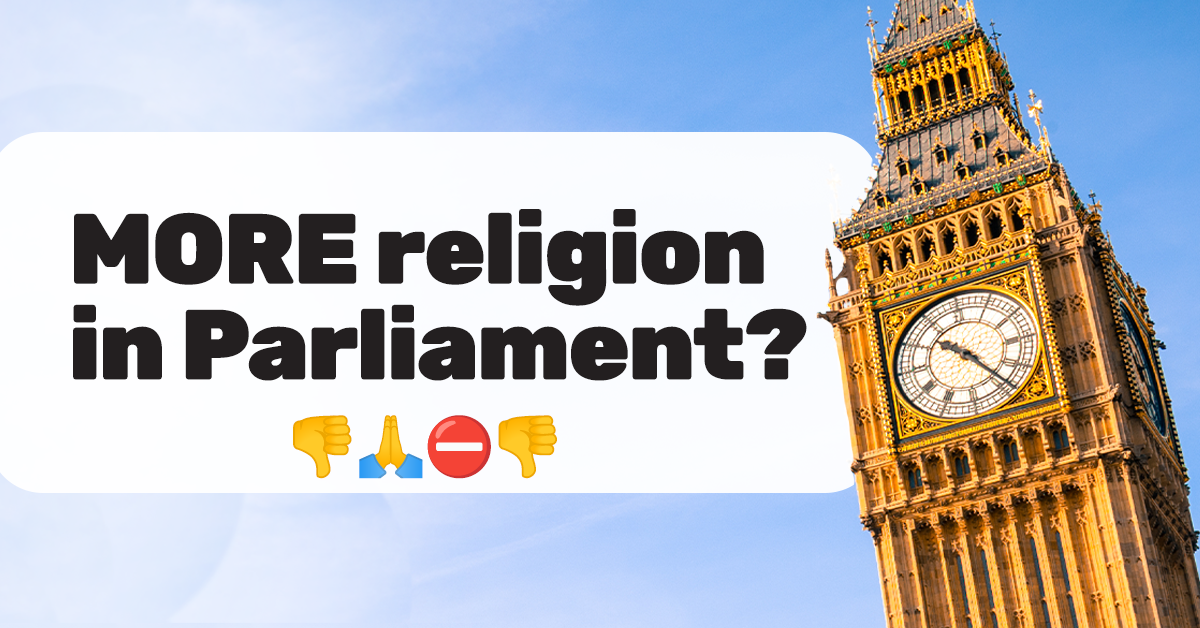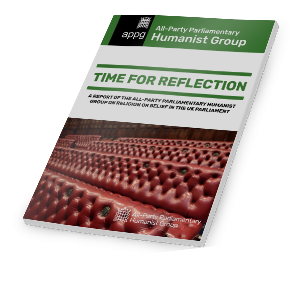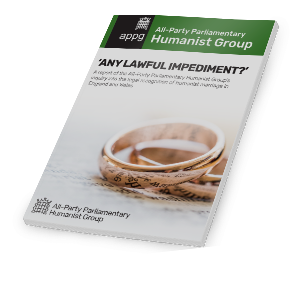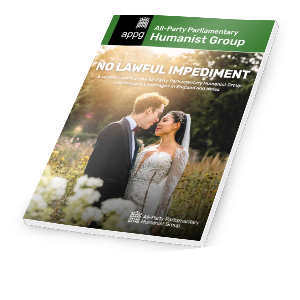
Humanists UK firmly opposes a recommendation made last week from a former speaker of the House of Lords that,
‘to have different faiths and denominations statutorily appointed would be a good idea.’
Baroness D’Souza, discussing the future membership of the House of Lords in Parliament, advocated for the continued presence of automatically appointed religious representatives within the House of Lords.
Supporters of the idea, including approximately half the Church of England clergy, argue that it would help to improve the already highly discriminatory system of having 26 automatic seats in the House of Lords for Church of England bishops. However, the problems with this solution are significant, and if anything, would only exacerbate many of the problems they seek to solve.
We don’t need MORE religion in Parliament
Many religions or belief systems do not have a similar hierarchical structure of the Church of England, meaning that picking someone to represent the members of that faith in Parliament is impossible. Even the Church of England bishops do not necessarily represent the views of Anglicans. For example, the Assisted Dying for the Terminally Ill Bill was opposed by the bishops, yet was supported by 81% of Protestants. Other difficulties would include the fact that the Catholic clergy are not allowed to take up any seats in the legislature due to the rules of the Catholic church, automatically excluding them from the process.
Expanding the list of automatic seats in the Lords to other denominations would still explicitly exclude religious minorities not included, as it would be impossible to cover all beliefs in the UK. This would also firmly exclude and disadvantage the non-religious from the political process.
Any proposal to address the discriminatory nature of 26 Anglican bishops in the Lords by simply adding even more religious leaders to the mix would only compound the House’s existing unrepresentative bias in favour of traditional, institutional, and socially conservative views and beliefs. As it stands, in practically every religious denomination, lay members of religions tend to have more socially liberal views on social issues (such as LGBT rights and abortion) compared with official doctrine.
Such proposals also pay too little attention to the fact that, while the majority of adults in Britain today are non-religious, due to age and social demographics the House of Lords is already overwhelmingly religious in comparison with the general public.
Public opinion
Public opinion is also firmly opposed to the idea of automatic seats for religious representatives. 62% take this view, while 8% support the present situation in the Lords, and only 12% want other religions represented.
This practice of giving religious representatives seats in Parliament as of right, is undemocratic, unequal and violates the principle of freedom of religion or belief.
Humanists UK’s Director of Policy and Public Affairs, Kathy Riddick said:
‘In 2024 it is simply unacceptable that automatic seats in Parliament are given to members due to their religious affiliation. It is even more concerning that some are arguing for this outdated and discriminatory practice to be continued. Such a proposal not only infringes upon the principles of a secular democracy but also encroaches upon the fundamental freedom of religion and belief.’
Notes
For further comment or information, media should contact Humanists UK Director of Public Affairs and Policy Kathy Riddick at press@humanists.uk or phone 020 3675 0959.
Read more about our work on secularism and bishops in the House of Lords.
Humanists UK is the national charity working on behalf of non-religious people. Powered by over 120,000 members and supporters, we advance free thinking and promote humanism to create a tolerant society where rational thinking and kindness prevail. We provide ceremonies, pastoral care, education, and support services benefitting over a million people every year and our campaigns advance humanist thinking on ethical issues, human rights, and equal treatment for all.
Reports of the All-Party Parliamentary Humanist Group
Humanists UK is secretariat to the All-Party Parliamentary Humanist Group (APPHG), a group of MPs and peers who meet to discuss humanist issues and support many of the same causes we do. We provide administrative support and policy expertise to the group’s own research work. Some of the APPHG’s published reports are collected below.

Time for Reflection
The All-Party Parliamentary Humanist Group examined the treatment of religion or belief in the UK Parliament, including practices like appointing bishops to the House of Lords and use of ‘prayer cards’.

Any Lawful Impediment?
The All-Party Parliamentary Humanist Group published this report on its inquiry into delays legalising humanist marriage in England and Wales.

No Lawful Impediment
An examination of the case for legal marriage reform, including humanist marriages, in light of the then-ongoing Law Commission review of domestic marriage law .
